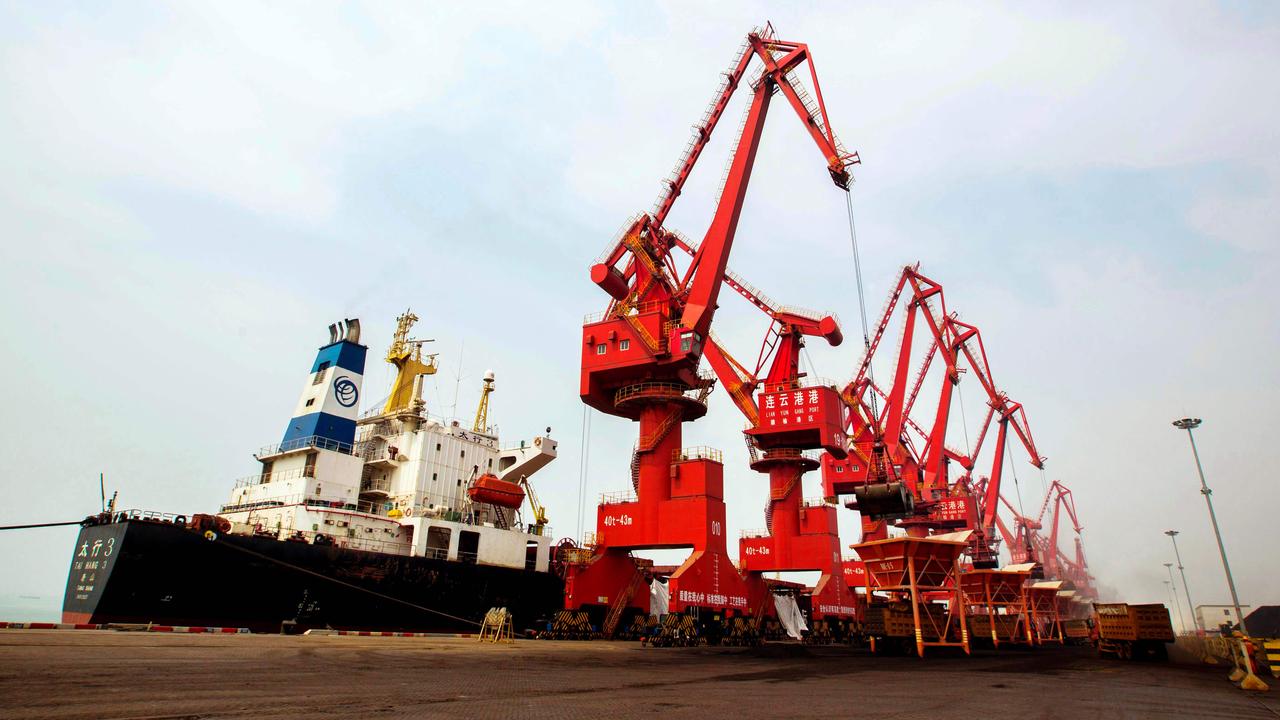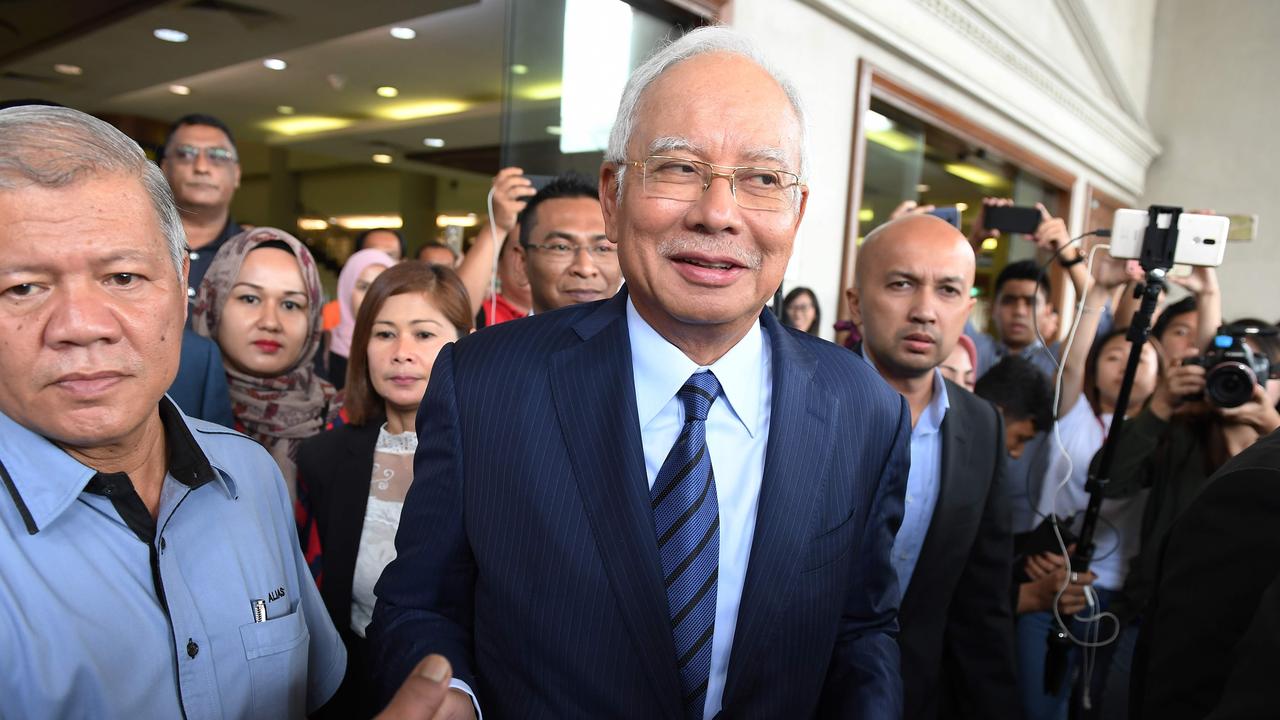Donald Trump’s hard line on trade risks support for N Korea policy
Donald Trump’s hard line on trade with China, Japan and South Korea could weaken support for his North Korea policy.

Imports, bad. Exports, good.
Donald Trump is clear about that.
So, the trade relationship with Japan? “Horrible.” With South Korea? “Horrible.” With China? “Horrible.”
The latter is of course the worst, because it’s the biggest.
“We can’t continue to allow China to rape our country,” the US President has said.
He told business leaders in Tokyo on Tuesday that Japan, with which the US has its second biggest trade deficit — $US69 billion ($90bn) in 2016 — had been “winning” for decades: “We want fair and open trade, but right now our trade with Japan is not fair and open.”
So what might he have to say about Australia? Last year we exported $12.5bn in goods to the US and imported $30bn. We exported $8bn in services and imported $14bn. One can imagine him relishing tweeting, “Losers!”
But are we? Australia has been running a trade surplus, overall, all 2017. We sell some stuff, and some services, to people and places that need what we can best supply, and buy from others, stuff and services, we can’t readily or competitively provide ourselves.
Trump appears to believe claims that China has somehow suddenly sucked away America’s trade surpluses by exporting more aggressively while restricting imports. But the US has had overall global trade deficits for 40 years in a row. That started way before Wal-Mart began sourcing everything from China.
The US dollar is the chief issue, not China itself. It is the global currency and it’s excessively strong, inevitably always in demand.

Trump appears to dislike multilateral trade deals. He also hates most bilateral deals, wanting for instance to unravel the free trade agreement concluded five years ago with South Korea — at a massive cost in terms of political capital for free-trade supporting Korean politicians, who confronted mass, sometimes violent, demonstrations at every stage.
He, however, loves personal deals, as anyone who saw him in his earlier incarnation on TV will recall. Thus the main take-home from his nine-day visit to Asia may well come from the 40 business leaders accompanying him — who have already negotiated one-off contracts in the countries he is visiting, and especially China, that will be announced en route.
Transactional, transient deals, however welcome, rather than structural change.
While protectionists in the US also complain about the amount of capital being invested by American corporations in China, in fact it is only 11.5 per cent of America’s international investment, below half the proportion from Japan or South Korea.
American firms may not even want to boost that proportion significantly, since foreign investment tends to follow export patterns — one makes stuff inside markets where they buy a lot of that stuff of yours already.
But the largest US export categories into China are agricultural, led by soybeans. The US won’t buy land and grow things in China.
The third largest US exports are Boeing planes and waste and scrap metal, followed by semiconductors and cars. Franchises like McDonald’s, KFC and Starbucks are highly profitable, but not strictly either merchandise exports or investments. Americans do make cars there, but also sell a lot out of the US.
The jobs that Trump claims have been lost to China, and more broadly to Asia, have in most cases actually gone nowhere at all. They have vanished due to new technologies, many of which have been developed by the US. Here, however, is where Trump is right.
For the opportunity cost to US companies of China’s protectionism is especially great in the hi-tech area in which America has so much to offer.
Deng Xiaoping 40 years ago launched the “reform and opening” era, encouraging foreign manufacturers — initially led by Taiwan and Hong Kong — to bring in capital, management and technologies, and the sector remains substantially run by foreign investors
But this Chinese government, in President Xi Jinping’s “new era”, has decided that Chinese firms will become the leaders of the new industrial wave, the tech and online wave, at first within China and then in the wider world.
Apple, eBay, Amazon, Uber, Microsoft, Facebook, Google and all the rest have in a few cases been allowed some scope to play inside the Chinese market, in other cases they have been eliminated — or taken over — swiftly there, and in others locked out entirely.
Xi wants the internet to become in China more of an intranet. Access to information and opinions via social media must be supervised by the party. Foreigners cannot be trusted to perform this task, which is viewed as crucial for regime survival.
Chinese champions in the online sector, led by Tencent, Alibaba and Baidu, have thus been backed by Beijing, and have grown exponentially — though due also to their founders’ vision and energy.
Japan and South Korea did something similar decades ago, fostering local champions by letting them flourish almost unchecked, with only limited domestic competition within their own markets. But those countries have largely moved on from there, to encourage their corporations to embrace broader global opportunities while they face more contested markets at home.
“Try building your cars in the US instead of shipping them over. Is that rude to ask?” Trump asked in Tokyo. Yes it was rude, because 75 per cent of Japanese-brand cars bought in America are already made there.
We in Australia are in our own way exemplars in openness and flexibility — crucial factors in our uninterrupted decades of economic growth.
The 12-nation Trans-Pacific Partnership offered a sophisticated way to develop a platform opening opportunities to businesses within a fairer framework than previous market arrangements had provided. Trump pulled the US out of that hard-won deal.
During this Asia tour, he needs to row back from that dark day, to regain respect for American can-do and preparedness to build great business relationships in Asia, the engine of world economic growth.
His ability to achieve other goals in the region, including full support for his North Korea policy, depends to a degree on it. That requires a more nuanced understanding of the global economy than “exports good, imports bad”.




To join the conversation, please log in. Don't have an account? Register
Join the conversation, you are commenting as Logout